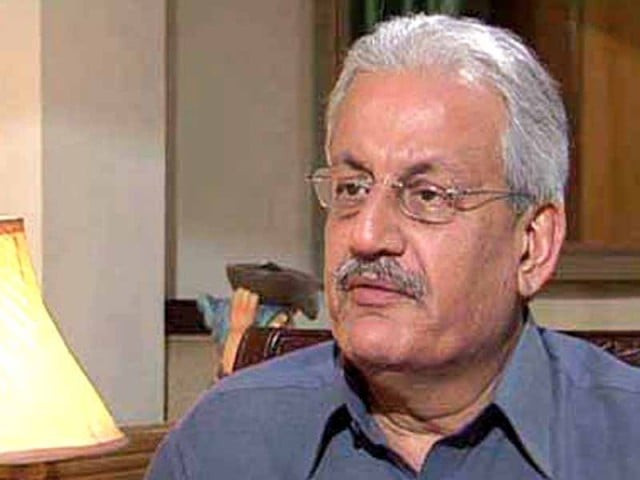Rabbani withdraws Senate bills to protest ISI’s new role
Says the constitution is struggling to survive amid 'attacks' on it from offices functioning under it

Former Senate chairman and PPP’s stalwart Senator Raza Rabbani on Wednesday withdrew five bills he introduced to mark his protest against the prevailing violations of constitutional provisions and the decision of the PMLN-led coalition government to give the Inter-Services Intelligence (ISI) legal cover to screen civilian officials.
Announcing his decision on the floor, he said when the offices functioning under the constitution were wilfully violating it, it seemed inappropriate and an exercise in futility to make further amendments to it.
Raising alarms over the government granting the spy agency legal cover to keep tabs on the civilian setup, he said the constitution itself was struggling to survive.
"The constitution is under attack and an amendment can only be made if it manages to survive," he added and deplored that the concept of civilian supremacy was being gradually tarnished.
The PPP stalwart further lamented that it was saddening that the spy agency will now be involved in the transfers and postings of civil bureaucracy.
"Where are we heading [with this law]?" he questioned.
The bills he sought to withdraw were the Constitution (Amendment) Bill, 2018 (Amendment of Article 27); the Constitution (Amendment) Bill, 2020 (Amendment of Article 89); the Constitution (Amendment) Bill, 2021 (Amendment of Articles 57, 62, 72, 73, 86, 89, 126, 159, 160, 162 and 166); the Constitution (Amendment) Bill, 2021 ( Amendment of Article 89) and the Constitution (Amendment) Bill, 2021 (Amendment of Article 160).
However, lawmakers opposed Mr Rabbani's decision to withdraw the bills.
The chair deferred this motion for consideration on other private members’ day. Senator Seemee Ezdi (PTI) also moved a motion to withdraw the Constitution (Amendment) Bill, 2021] as introduced in the Senate on May 31, 2021 (Amendment of Article 59) which was passed by the house.
On Friday, when the reports of government granting the premier agency legal cover surfaced, Rabbani had vehemently condemned it, saying this additional task would be tantamount to over-burdening the institution.
Moreover, he said, it also blurred the distinction between the civil and military bureaucracy and expressed a lack of confidence in the civilian apparatus of the state. He said the Civil Servants Act 1973, as amended by parliament, was a comprehensive law and it did not provide for such screening of civil servants.
It is pertinent to note that the government's decision to "officially" empowering the ISI, the country’s premier spy agency, to ‘vet and screen’ civil servants before their induction, appointment, posting and promotion, has stirred strong misgivings from both coalition partners as well as PTI.
The Human Rights Commission of Pakistan (HRCP) has also expressed concern over the government’s decision.
“Even if this practice was already in place, it goes against democratic norms. The role of the military in civilian affairs needs to recede if Pakistan is to move forward as a democracy,” the HRCP stated.
According to the Establishment Division notification: “In exercise of powers conferred by sub-section 1 of section 25 of the Civil Servants Act 1973 […] read with notification No. SRO 120 (1)/1998 […] the Prime Minister is pleased to notify Directorate General Inter-Services Intelligence (ISI) as [the] Special Vetting Agency (SVA) for verification and screening of all Public Office Holders (Officers Category) …”.
The quoted laws — i.e., Sub-section 1 of section 25 of the Civil Servants Act as well as SRO 120 — empower the prime minister to amend or make rules for the civil bureaucracy. The direction to notify the ISI as SVA had been issued from the office of the Prime Minister on May 06, 2022.



















COMMENTS
Comments are moderated and generally will be posted if they are on-topic and not abusive.
For more information, please see our Comments FAQ